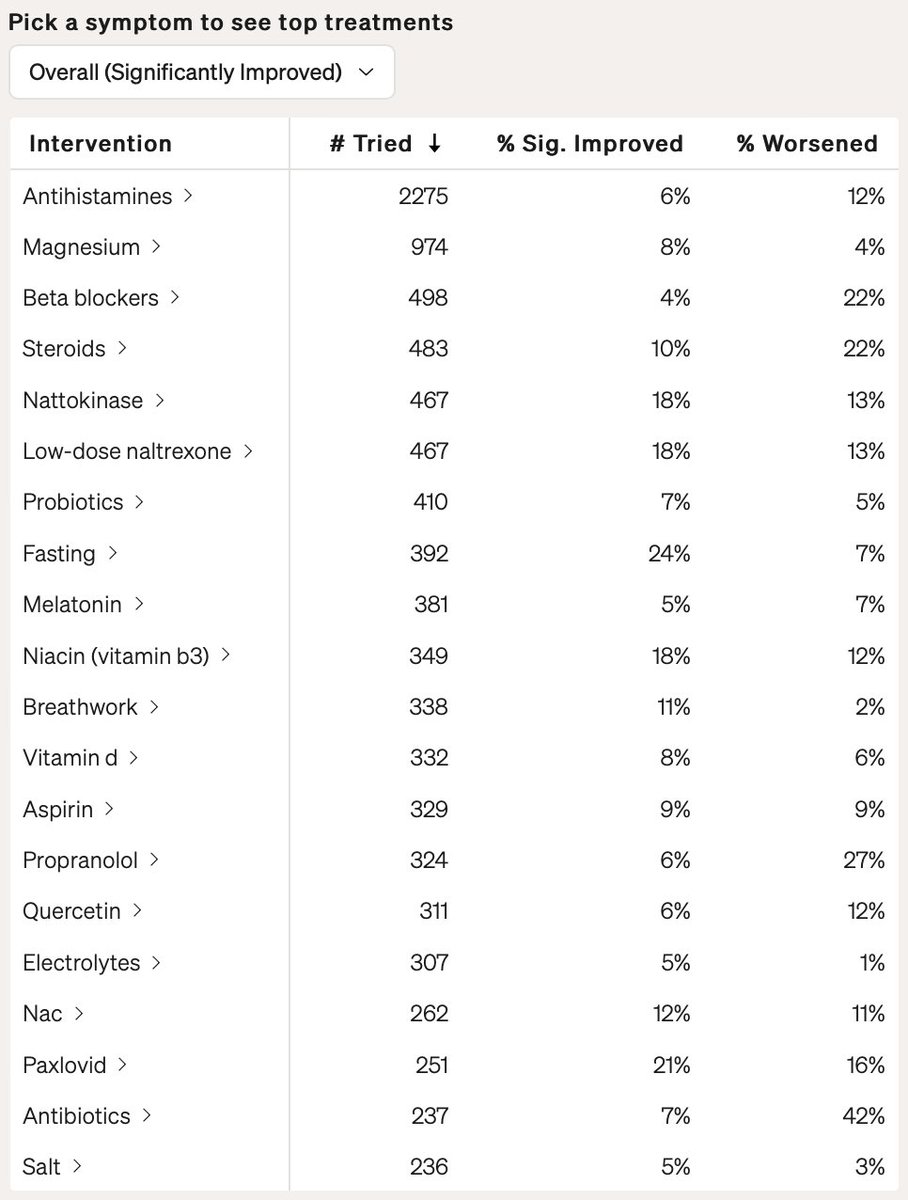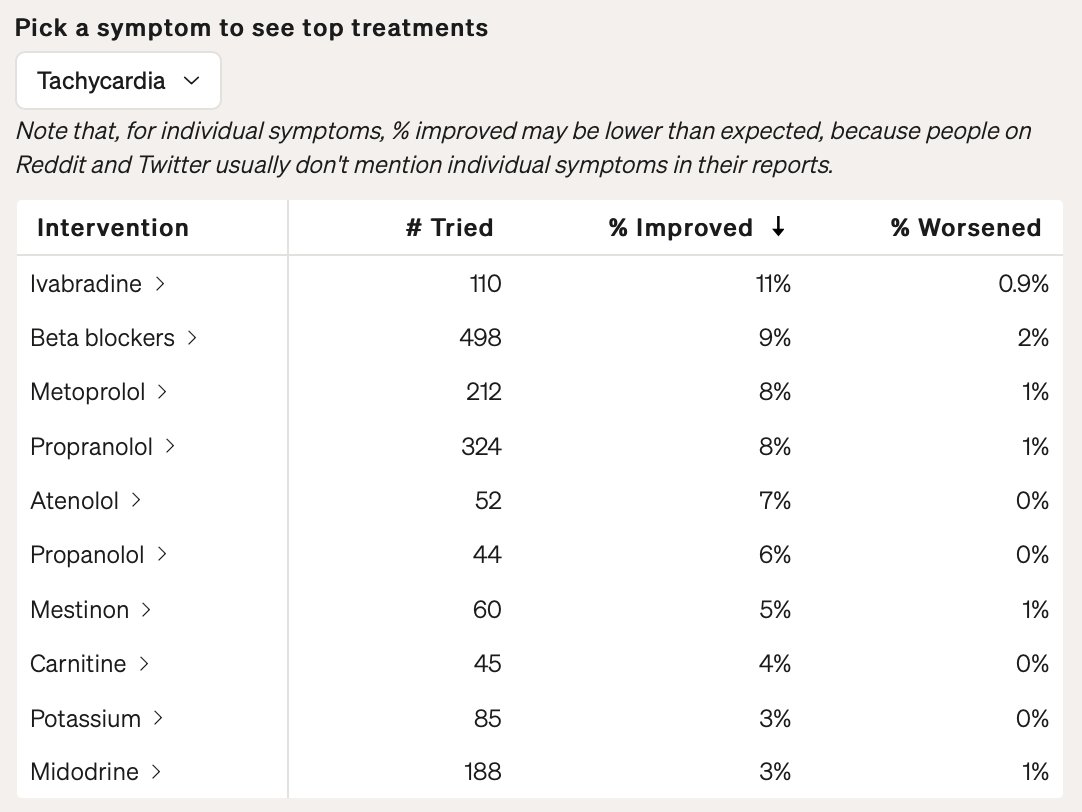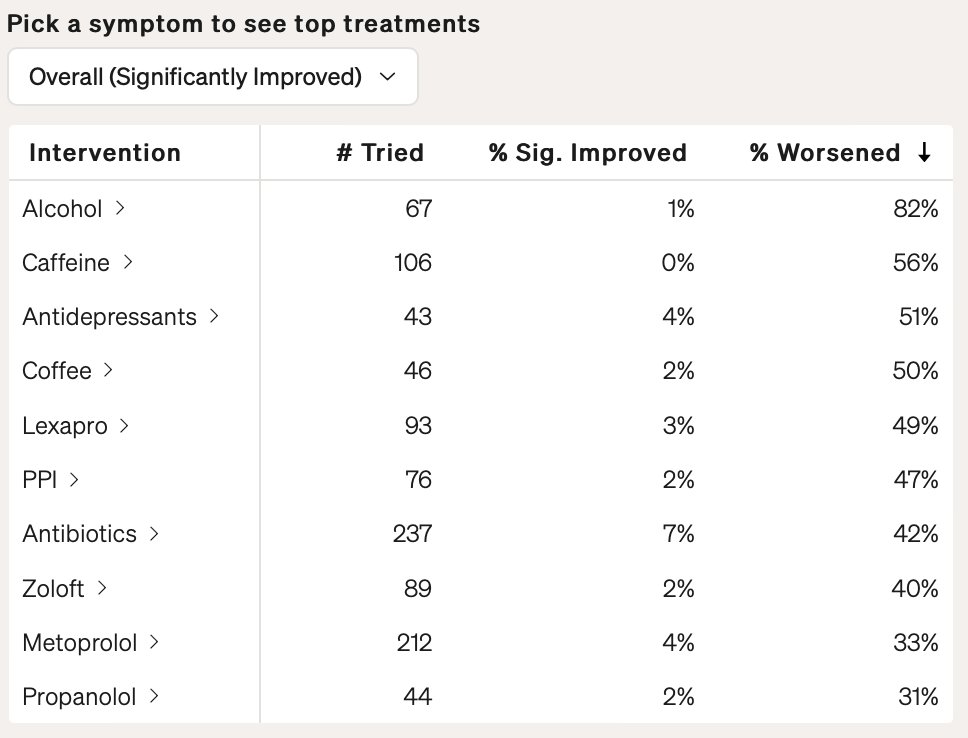
Sharing out some results from our ai-powered #LongCovid site:
* Most popular
* Most effective overall
* Most effective for POTS, Fatigue, Brain Fog, and more
These results are *directional*, but in the spirit of empowering patients with more information, we wanted to share.
🧵
* Most popular
* Most effective overall
* Most effective for POTS, Fatigue, Brain Fog, and more
These results are *directional*, but in the spirit of empowering patients with more information, we wanted to share.
🧵
1/ Sources
* Twitter
* Reddit: 2 LC subs, plus r/cfs, r/pots, r/mcas, r/eds, and r/dysautonomia
We collected >35k treatment reports, and read them w/ an AI model to (imperfectly) see if people improved/worsened.
We show all raw data and inferences in case you want to vet!
* Reddit: 2 LC subs, plus r/cfs, r/pots, r/mcas, r/eds, and r/dysautonomia
We collected >35k treatment reports, and read them w/ an AI model to (imperfectly) see if people improved/worsened.
We show all raw data and inferences in case you want to vet!
2/ Top 20 most popular
This helps us gut check the data. Indeed, we see some familiar faces - antihistamines, nattokinase, LDN, probiotics, etc.
The beta blocker reports are mostly coming from r/pots, and the steroid reports are largely from r/mcas.
This helps us gut check the data. Indeed, we see some familiar faces - antihistamines, nattokinase, LDN, probiotics, etc.
The beta blocker reports are mostly coming from r/pots, and the steroid reports are largely from r/mcas.

3/ Most effective overall
Significant improvement
1. HELP Apheresis
2. Tollovid
3. Serrapeptase
4. Fasting
5. HBOT
Any improvement
1. Sleep
2. Pacing/rest
3. Kefir (👀 @remissionbiome)
4. Anti-inflammatory diet
5. Meditation

Significant improvement
1. HELP Apheresis
2. Tollovid
3. Serrapeptase
4. Fasting
5. HBOT
Any improvement
1. Sleep
2. Pacing/rest
3. Kefir (👀 @remissionbiome)
4. Anti-inflammatory diet
5. Meditation


4/ Top for #POTS symptoms
1. Hydration
2. Salt
3. IV fluids
4. Compression stockings
No big surprises here!
Note that % improved for specific symptoms is lower b/c people don't always call out the symptoms that improved. For these, just focus on relative ranking
1. Hydration
2. Salt
3. IV fluids
4. Compression stockings
No big surprises here!
Note that % improved for specific symptoms is lower b/c people don't always call out the symptoms that improved. For these, just focus on relative ranking

5/ Top for Fatigue
1. Carnitine
2. LDN
3. Vitamin B6
4. Ashwagandha
5. Pacing
Nice to see #LDN so high on the list, with large n!
Btw, check the LDN page to see most popular dosages (most common was 4.5mg)
ai.eurekahealth.com/longcovid/Low-…
1. Carnitine
2. LDN
3. Vitamin B6
4. Ashwagandha
5. Pacing
Nice to see #LDN so high on the list, with large n!
Btw, check the LDN page to see most popular dosages (most common was 4.5mg)
ai.eurekahealth.com/longcovid/Low-…

6/ Top for #BrainFog
1. Wellbutrin
2. Guanfacine
3. Carnitine
4. Anti-inflammatory diet
5. Fish oil
Interesting to see Carnitine popping up again, it wasn't previously on my radar!
1. Wellbutrin
2. Guanfacine
3. Carnitine
4. Anti-inflammatory diet
5. Fish oil
Interesting to see Carnitine popping up again, it wasn't previously on my radar!

7/ Top for #PEM
1. Lumbrokinase
2. Lactoferrin
3. Pacing
4. Kefir
5. VNS
Interesting to see Kefir bubbling up again, and cool to see Lumbro at the top of this list (#TeamClots).
Note that all improved % values much lower than for POTS; possibly PEM is harder to treat
1. Lumbrokinase
2. Lactoferrin
3. Pacing
4. Kefir
5. VNS
Interesting to see Kefir bubbling up again, and cool to see Lumbro at the top of this list (#TeamClots).
Note that all improved % values much lower than for POTS; possibly PEM is harder to treat

8/ Top for Tachycardia
1. Ivabradine
2. Beta blockers
3. Metoprolol
4. Propranolol
5. Atenolol
All heart meds - makes sense! On the non-prescription side, we also see carnitine and potassium in the top 10.
1. Ivabradine
2. Beta blockers
3. Metoprolol
4. Propranolol
5. Atenolol
All heart meds - makes sense! On the non-prescription side, we also see carnitine and potassium in the top 10.

10/ Bonus 2: Some unexpected ones (each n=1)
* Tanning bed
* Marshmallow
* La Croix
* 528hz frequency
ai.eurekahealth.com/longcovid/528h…
* Tanning bed
* Marshmallow
* La Croix
* 528hz frequency
ai.eurekahealth.com/longcovid/528h…
11/ Caveats
Some of these treatments have real risks, and you should talk to your doctor before making any major changes to your treatment regime.
Also, these data shouldn't be given the same weight as actual surveys or controlled studies!
Some of these treatments have real risks, and you should talk to your doctor before making any major changes to your treatment regime.
Also, these data shouldn't be given the same weight as actual surveys or controlled studies!
What do you think? Any surprises?
Click the link below to see the results for your own symptoms/conditions, and see user reports for any treatments you're curious about (it's 10x better than searching twitter).
ai.eurekahealth.com
Click the link below to see the results for your own symptoms/conditions, and see user reports for any treatments you're curious about (it's 10x better than searching twitter).
ai.eurekahealth.com
• • •
Missing some Tweet in this thread? You can try to
force a refresh







